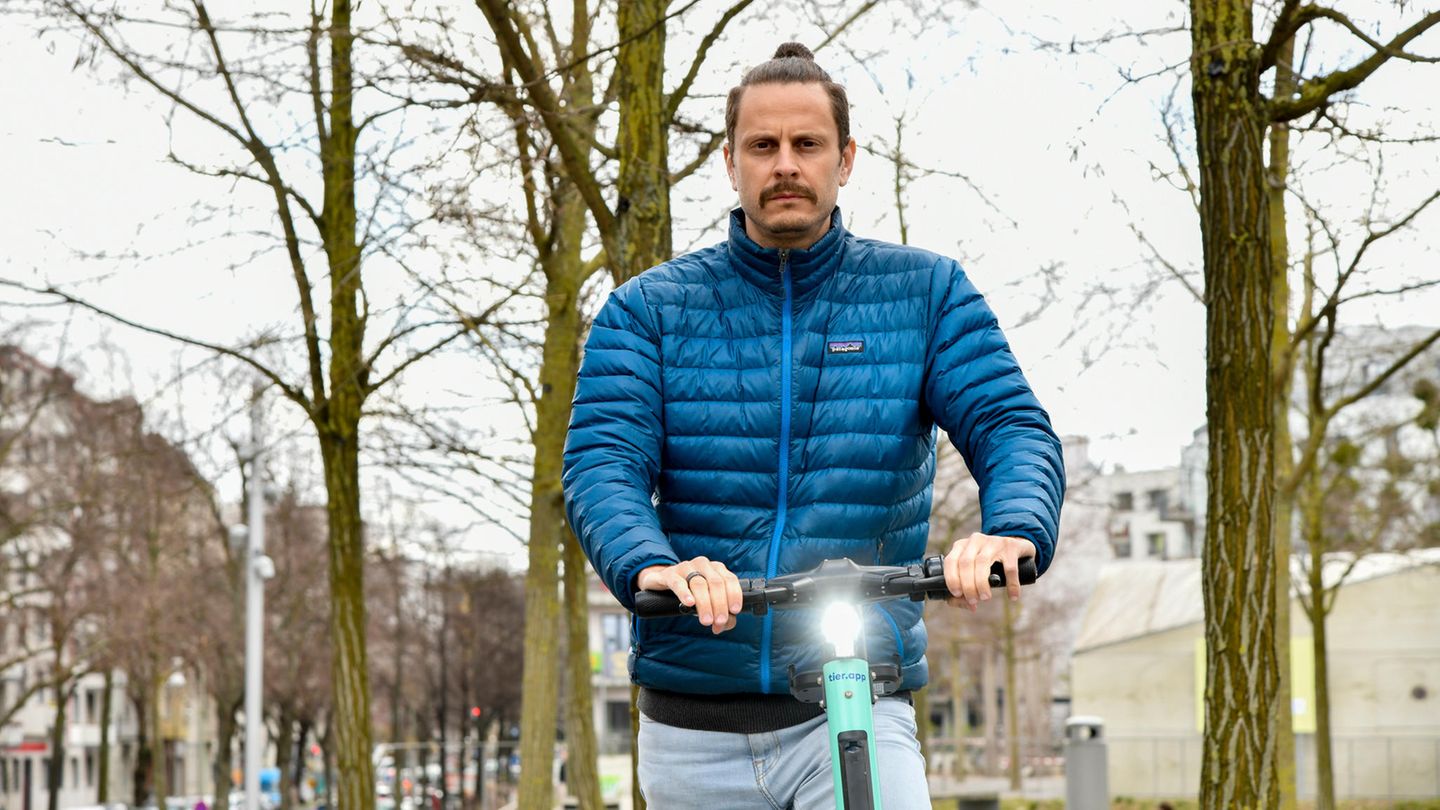The e-scooter start-up Tier was once worth 1.7 billion euros – now it has to merge with a much smaller competitor. Founder Lawrence Leuschner on failed growth plans, further layoffs and his personal future.
This article is adapted from the business magazine Capital and is available here for ten days. Afterwards it will only be available to read at again. Capital belongs like that star to RTL Germany.
The once hyped e-scooter market is in crisis, and there is increasing pressure for consolidation in the industry. Market pioneer Bird filed for bankruptcy at the end of 2023 – the German market leader Tier announced at the beginning of the year that it would merge with a competitor, the much smaller Dutch-French start-up Dott. Tier founder talks about the background of the unequal partnership, the situation in the start-up scene and his personal future Lawrence Leuschner in the interview.
Capital: Mr. Leuschner, Dott was one of your fiercest rivals Europe. Why are you joining forces now?
LAWRENCE LEUSCHNER: It was clear to us that the market needed consolidation. As one of the biggest players, we wanted to lead the way. We looked at the options and determined that Dott was the right partner for us.
For what reason?
For various reasons: We have a very similar picture of the future and share the same values - in our dealings with our customers, the cities and in the standards for sustainability and safety. There is now coming a time when we need to work more together rather than against each other – and not just in our industry.
Why is consolidation needed now?
Five years ago we started with 25 competitors. After Bird’s exit from the European market, there are now four or five players left. Size helps with profitability – and that is absolutely crucial for all start-ups. Accordingly, it is important to cement its market leadership.
According to your own statements, you were already the market leader with Tier and are present in around 400 cities, Dott only in 50. What will be better as a result of the merger?
We are the market leader in Europe, that’s right. At a local level, however, there are a few markets where we are not – for example in Italy, France and Belgium. But we want to be number one in all relevant cities. Dott helps us with this on a local level.
Nevertheless, this is not a merger of equals. And given your size, you, Mr. Leuschner, would actually be the logical candidate for the position of head of the new joint venture. Instead, you move to the supervisory board. Why?
Of course, on paper it’s an acquisition because we’re bigger. We talk about mergers because it is important to us to combine the best of both worlds. We therefore share positions at the management level. I had an open and honest conversation with Dott CEO Henri Moissinac about the CEO question. His vision for the company convinced me, and he is also an extremely experienced entrepreneur who, like me, started a business in the second-hand sector and was later successful as a tech manager at Facebook and Uber. In the end you have to look yourself in the eye. It then felt right for me to say: Henri, you do it.
You also have plenty of experience as an entrepreneur. Was that really the main reason?
It wasn’t because of trust and it wasn’t because I wasn’t the right man for the role. We both could have done it. For me it’s a nice option to take on another role again. There are also personal reasons for this. The last five years have been extremely intense.
Does the personnel also mean that the new company will be more aligned with Dott’s entrepreneurial philosophy? It is said that the French have a much more conservative cost discipline than Tier.
To do this, you first have to understand where both companies come from. Tier acquired many companies and was very aggressive in the market – we were “adventurous”. When the capital markets changed and the focus shifted to profitability, we had to change course very quickly. And of course when you’re driving a larger ship it takes time to turn. The company can be very proud that we reduced Ebitda from minus 63 percent in 2022 to minus 15 percent in 2023. Dott had a different growth philosophy from the start, but is not yet profitable. There is no right or wrong. Basically, over the next one or two years we will have a clear focus on profitability and less on growth – we did the same thing in both companies last year.
What are the crucial adjustments to get into the profit zone? Will there be more layoffs?
We only made cuts to staff and other cost items at the end of November in order to definitely become profitable. On the way together, we are now looking at offices and software – and in a few areas also the staff. We want to learn from each other. And when we eventually emerge with one brand and one operating unit, we will no longer need two warehouses and double teams. How exactly we leverage these synergies remains to be seen. And last but not least, as a competitor, we have so far taken away market share in some cities. We will look at these overlaps and how we can work together there in the future.
How large is the geographical distance between the animal and the dot?
We have a parallel presence in several cities in Belgium, France, Italy and Poland.
And in the end there will only be one brand left, right?
We want to keep both brands for now. Over time, of course, you want to move on to a brand and a tech platform.
At its peak, Tier was worth 1.7 billion euros. According to consistent reports, the new company is only valued at 150 million euros by investors. Where does this massive devaluation come from?
We never communicate reviews.
You published the 1.7 billion euros yourself in 2021.
At that point there was no other option because a stock exchange company had invested in us. In principle, however, we neither communicate ratings nor absolute sales and profit figures.
“We now have huge potential to become sustainably profitable”
Under your leadership, Tier has made a series of acquisitions and has penetrated new mobility areas and regions – including a failed expansion into the USA. In retrospect, do you regret the strategy that you previously described as “adventurous”?
You’re always smarter afterwards. If someone had told me that a pandemic would come that would set all our cities to zero, followed immediately by a war in Europe with a gas crisis and a recession – then of course I would have said: Let’s not be so “adventurous”. But unfortunately I couldn’t foresee that at the time. Everything could have worked out. Many decisions back then had good reasons, such as expansion into the USA. I don’t blame myself.
The many crises and the lack of capital have caught many start-ups that were previously designed for the fastest possible growth. At the moment it doesn’t look like there’s any improvement. How do you look forward to 2024?
Definitely much more optimistic. 2023 was simply a test of profitability. That was extremely stressful – I’m sure I’m not the only founder in Europe who says that. But we got a lot done. By joining forces with Dott, we now have huge potential to become sustainably profitable.
The market for rental e-scooters has often been declared dead. What do the numbers currently look like?
In contrast to many other markets, the industry has grown again this year. This also applies to us as a company, although we have made a huge leap in profitability. We’re talking about a double-digit million number of trips that we make every year. This isn’t hype that only lasts one day. Many cities are tackling sustainable mobility and building more cycle paths. And last but not least, we are not just a scooter company – 40 percent of our sales now come from the e-bike division.
In many cities, however, there is a heated debate over scooters. Berlin limits the number of vehicles, Paris has banned commercial e-scooter rentals entirely. How afraid are you of political headwinds?
We really should have other problems than discussing whether there should be 10,000 or 15,000 e-scooters in the city. Paris was a political thriller in itself, with the candidates trying to make their mark on the issue. But we are now very successful there with e-bikes. Sure, there are always cities where there are discussions. But there are also cities that want more e-scooters.
You move from the executive chair to the chairmanship of the supervisory board. For a serial founder like you, that shouldn’t be very busy. What are you planning to do next?
My absolute priority is to close the deal. A few closing conditions still need to be met in the coming weeks. Then the first thing will be to do a good job in my new role. Once that’s all said and done, I can still think about it.
For example about a new start-up?
Hmmm. (Thinks for a moment) I’ve never worked for anyone. There is probably no other option than to start your own business.
Source: Stern




